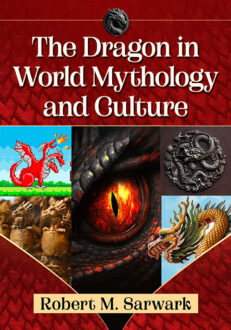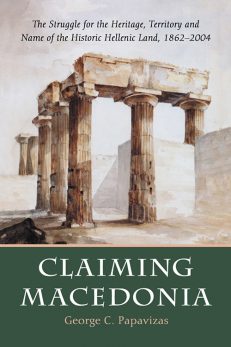Claiming Macedonia
The Struggle for the Heritage, Territory and Name of the Historic Hellenic Land, 1862–2004
$39.95
In stock
About the Book
For nearly 130 years, the Greeks, the Bulgarians, and the Yugoslavs have fought over the question of who has the historical and demographic rights to use the name “Macedonia.” Historically the land of Philip II and Alexander the Great, Aristotle, Mount Olympus and the Greek gods, Macedonia boasts an impressive cultural heritage that the Greeks have claimed as their own. In 1991, a state resulting from the breakup of Yugoslavia proclaimed itself Republic of Macedonia (FYROM), angering the Greeks and adding fuel to the persistent dispute.
This book argues the Macedonian question from a Greek perspective. It questions FYROM’s right to the Macedonian name, arguing that Greece possesses the historical, cultural, linguistic, anthropological and demographic ties to the legacy of Alexander. Research examines the origins of the dispute between Hellenism and Bulgarism, the Balkans wars, the world wars and the rise of Tito’s communism in Yugoslavia. The book also shows, step by step, the misconceptions about the legacy of Macedonia as promulgated by international communism, and carefully analyzes communism’s role as the main protagonist in the formation of the new state and as a pivotal source fomenting and fueling the Greek Civil War. Cover to cover, it traces the conflict’s change from an initial struggle between Hellenism and Bulgarism to the present dispute between Athens and Skopje.
About the Author(s)
Bibliographic Details
George C. Papavizas
Format: softcover (6 x 9)
Pages: 302
Bibliographic Info: 21 photos, maps, glossary, appendix, notes, bibliography, index
Copyright Date: 2006
pISBN: 978-0-7864-2323-1
eISBN: 978-1-4766-1019-1
Imprint: McFarland
Table of Contents
Acknowledgments vii
Preface 1
Introduction 11
Glossary and Abbreviations 19
1. The Origin of the Macedonian Question 21
2. The Balkan Wars and World War I (1912–1918) 75
3. The Rise of Communism and the Macedonian Question 87
4. World War II and the Struggle for Macedonia 104
5. State-Controlled “Macedonian” Ethnogenesis 145
6. The Greek Civil War and the Struggle for Macedonia 180
7. The Struggle for Macedonia After 1950 211
Appendix: A History of FYROM (or Balkan) Slavs Compared to the History of Greek Macedonians and Albanians, by Marcus Alexander Templar 243
Chapter Notes 251
Selected Bibliography 271
Index 281
Book Reviews & Awards
- “Papavisas has written a thoughtful account of the Macedonian issue, unlike any other publication to date. He examines the nature of Hellenic Macedonia and traces Macedonia’s Hellenic past. He focuses on the deliberate creation of a fraudulent history to promote wholesale misconceptions about Macedonia’s past and present. The author gives us a clear insight to the evolution of the problem from its beginnings as a Bulgarian land grab, through a Communist historical hoax to the present dispute with the Skopje, FYROM, government. He gives us a very comprehensive study of the issue from an accurate historical, cultural and political perspective. To those wishing to understand the Hellenic viewpoint, the author’s comprehensive study covers the conflict from initial stages to the present challenges. To his credit, the author certainly has achieved this lofty goal and his book is a must read to Hellenes and Philhellenes that want both historical accuracy and the preservation of heritage. In the words of former Congressman John Brademas, ‘The proper teaching of history can be crucial in promoting tolerance and peace.’ To this noble end, George Papavisas has given new meaning and appreciation to the ‘Macedonian Question’ and Hellenic heritage.”–Hellenic Cultural Commission
- “The manuscript, as written, provides an excellent account of events that preceded the fragmentation of Yugoslavia and the convulsions it brought about in the region. Thus far it is the best and most comprehensive analysis of the Macedonian issue that politicians and policy-makers will be well advised to read.”–Nikolaos AS. Stavrou, Professor International Affairs (Emeritus) Howard University





